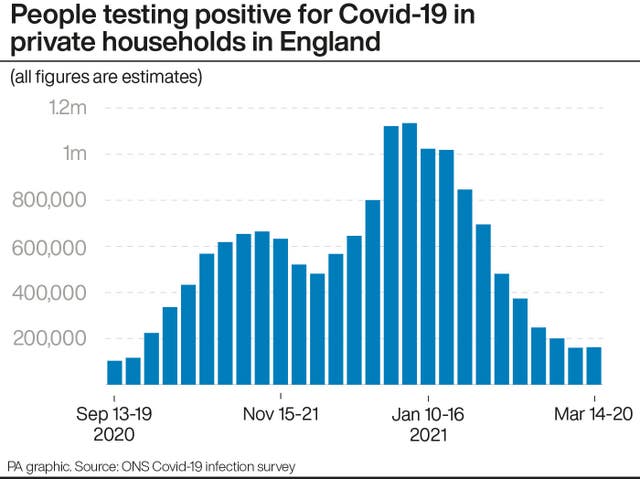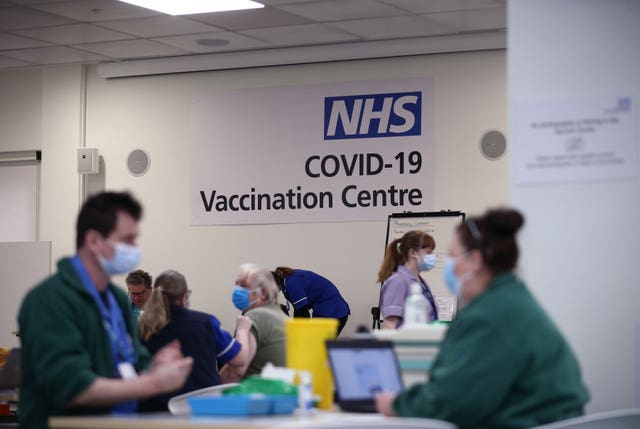Government remains confident in UK vaccine supply, minister says
The Government has pledged to offer a first dose of a vaccine to all adults by the end of July.

The Government has absolute confidence in UK vaccine supplies, with all adults on track to receive a first dose by the end of July, a Government minister has said.
Communities Secretary Robert Jenrick said the UK’s vaccine programme will continue to be “world-leading”, despite a row with Europe over vaccine exports.
It comes as new figures from the Office for National Statistics (ONS) estimate around one in 340 people in private households in England had Covid-19 in the week to March 20 – unchanged on the previous week, suggesting a levelling off.

The picture remains broadly similar in Wales and Northern Ireland, with a slight rise in infections in Scotland.
Prof James Naismith, from the University of Oxford, said: “Today’s ONS data are less reassuring than last week; they serve as a caution but not yet evidence we need to change course.”
European Union leaders stopped short on Thursday evening during a European Council meeting of banning exports of vaccines, as a disagreement with the Anglo-Swedish pharmaceutical firm AstraZeneca continues.
While giving a backing in principle for toughened export controls, a statement following the summit stressed the importance of global supply chains in producing jabs.
European Commission President Ursula von der Leyen said AstraZeneca must “catch up” on deliveries to the EU before exporting doses elsewhere, with her views receiving support from Italy, Spain and France.
But Belgium and the Netherlands are among those resisting the use of export controls.
On Friday, asked about the progress of negotiations with the UK on sharing coronavirus vaccines, European Commission chief spokesman Eric Mamer told a briefing: “All I can tell you is that discussions with the UK are ongoing.
“We don’t have any comments to make at the moment on the gist and content of those discussions.
“Our common aim is to ensure we have good co-operation in terms of supply chains and producing the vaccine.”
Also on Friday, the European Medicines Agency (EMA) signed off moves that will increase manufacturing capacity and supply of Covid-19 vaccines.
It approved the Halix site in Leiden in the Netherlands for the production of AstraZeneca’s active vaccine substance, taking the total number of manufacturing sites licensed for the production of the substance to four.
It also approved a new manufacturing site in the German city of Marburg and more flexible storage conditions for the BioNTech/Pfizer vaccine.
The site will produce both active substance and the finished product for the jab, which is being used in the bloc and the UK.
Speaking to Good Morning Britain on Friday, Mr Jenrick said the UK’s plans were still on track, adding: “We are confident we have got the supplies that we need both to meet our mid-April target of vaccinating all the over-50s and those people with clinical vulnerabilities, and the bigger target, which is that every adult at least has had their first jab by the end of July.
“Of course, anyone who has an appointment for a jab, either their first one or second one, there is no need to worry – those appointments will be honoured.”
Pressed on where UK vaccine doses would come from if Brussels did apply an export ban, he added: “We’ve chosen since the start not to discuss our supply chains. We think that’s the right decision.
“We’re getting our vaccines from multiple manufacturers, from all over the world with complex international supply chains – none of them are reliant on any one factory or any one country.
“What I can assure your viewers of is our absolute commitment and confidence that we will be able to deliver on the targets that the Prime Minister has set out, so there is no reason to worry – the vaccine programme will continue and it is going to continue to be a world-leading one.”
Asked whether the UK had exported any vaccines to the EU, Mr Jenrick told Sky News: “Vaccines are based on complex international supply chains.
“There are elements of the vaccines being produced in the UK, there are elements being produced in parts of the European Union and indeed all over the world – we are working with the Serum Institute, for example, in India.
“So it is critical for all countries that there is the free flow of medical products, including vaccines, across international borders, and it would be very damaging if countries started to pull up drawbridges and prevent vaccines, medicines or elements of them from crossing international borders, and the UK strongly opposes that.”

The Government has denied reports from France that the UK could struggle to secure second doses due to the row in the EU.
A spokesman said: “We’re on track to meet our vaccination targets and everyone will get their second dose within 12 weeks of their first.”
Later, Mr Jenrick told Times Radio that the issue of vaccine passports for international travel may be down to individual countries.
He said: “Of course on the international stage, vaccine certification is not entirely within our control and if our citizens want to travel abroad, we’ll need to ensure that they are able to do so.
“Domestically, there are a range of issues we need to work through, that work is now happening and it will be reporting back later. But if we do go down that route, we don’t anticipate it being in the near term.”
Asked about Tory objections to the possible scheme, he said: “I completely understand the reservations that many people have in Parliament and across the country.
“We’re looking into the practical issues, the ethical concerns and we’re being guided by the best medical and scientific opinion and we will be bringing forward the outcome of that work in the coming weeks.
“We don’t have an immediate plan to take action. Our focus at the moment is the vaccine rollout – that has to be our priority.”
Mr Jenrick told LBC radio vaccine passports were part of a “wide range of options” which were being considered “in the longer-term, once the whole country has been vaccinated”.
Meanwhile, the reproduction number – the R value – across the UK is between 0.7 and 0.9, according to the latest Government figures. This is compared to 0.6-0.9 last week.





